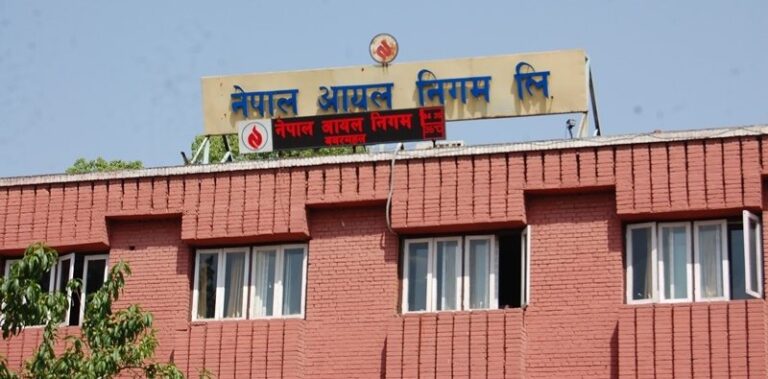
The Nepal Oil Corporation (NOC) has obtained a revised price list of petroleum products from the Indian Oil Corporation (IOC).
The revised IOC pricelist puts the highest purchase prices for the NOC so far.
As per the IOC new price list, the NOC shall pay Rs 182.81 for petrol per liter, Rs 169.44 for diesel, Rs 113.49 for kerosene, Rs 131.94 for avian turbine fuel (domestic), Rs 114.51 for avian turbine fuel (international), Rs 2,240.34 for per filled cylinder of LP gas to IOC for the import and the figures include the import tax.
The NOC is expected to incur a loss of Rs 10.61 billion from the supplies of petroleum products in a month (mid- March-mid April), according to NOC Spokesperson Binitmani Upadhyay.
However, the NOC securing gross profits from the sale of kerosene and avian fuel and the profit has no significant contribution to reducing the loss.
As per the new price list, the NOC has incurred a loss of Rs 32.81 on petrol per liter, Rs 36.44 on diesel and Rs 665.34 per filled gas cylinder.
However, it has been enjoying a profit of Rs 19.51 on kerosene per liter, Rs 4.6 on aviation fuel (domestic) and Rs 43.84 on aviation fuel (international).
Nepal has consumed 32,915 kiloliters petrol, 86,910 kiloliters of diesel, 770 kiloliters of kerosene, 2,779 kiloliters of aviation fuel (domestic), 4,000 kiloliters of aviation fuel (international) and 1,899,278 filled gas cylinders in 15 days period, the NOC has estimated.
Currently, petrol is available in the market at Rs 150 per liter. Similarly, price of diesel and kerosene is Rs 133 each, Rs 136 aviation fuel (domestic), 1.29 dollar aviation fuel (international) and Rs 1,575 per filled gas cylinder.
The government has been levying various taxes on the import of petroleum products at the customs point. The government has been imposing Rs 59.48 in tax on petrol per liter, Rs 42.16 on diesel, Rs 13.36 on kerosene and Rs 19.49 on aviation fuel (domestic).
Similarly, the government has been levying Rs 2.8 in tax on aviation fuel (international) and Rs 280.30 per filled cylinder on LGP Gas. The various taxes levied on petroleum products are supposed for road maintenance, pollution, VAT, price stabilisation fund among others.
The sales price of petroleum products is determined by adding the transportation fare, administrative and sales expenses of the Corporation as well as insurance, technical loss and profit for the sellers.
Source : RSS,






